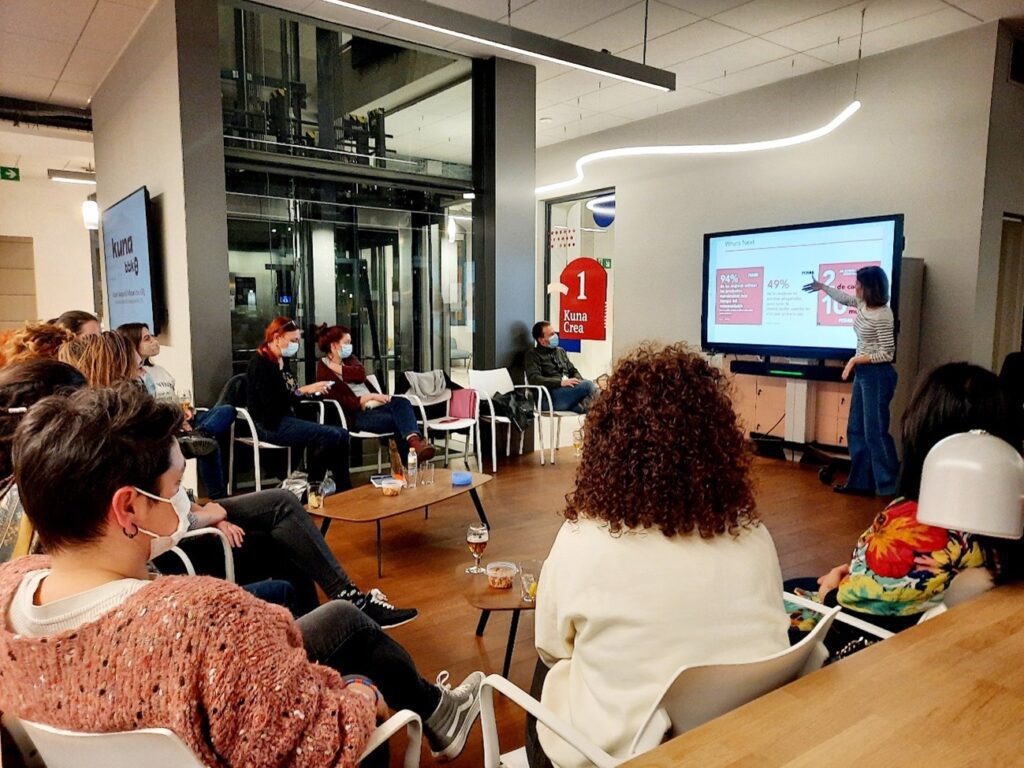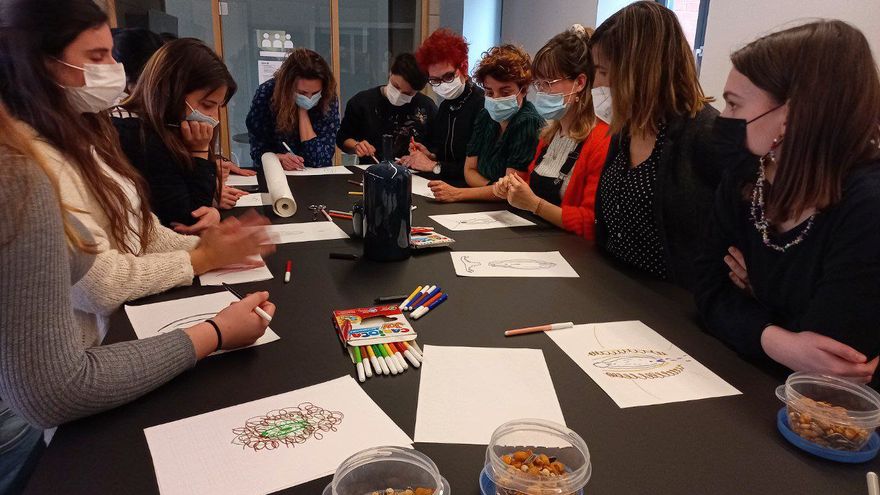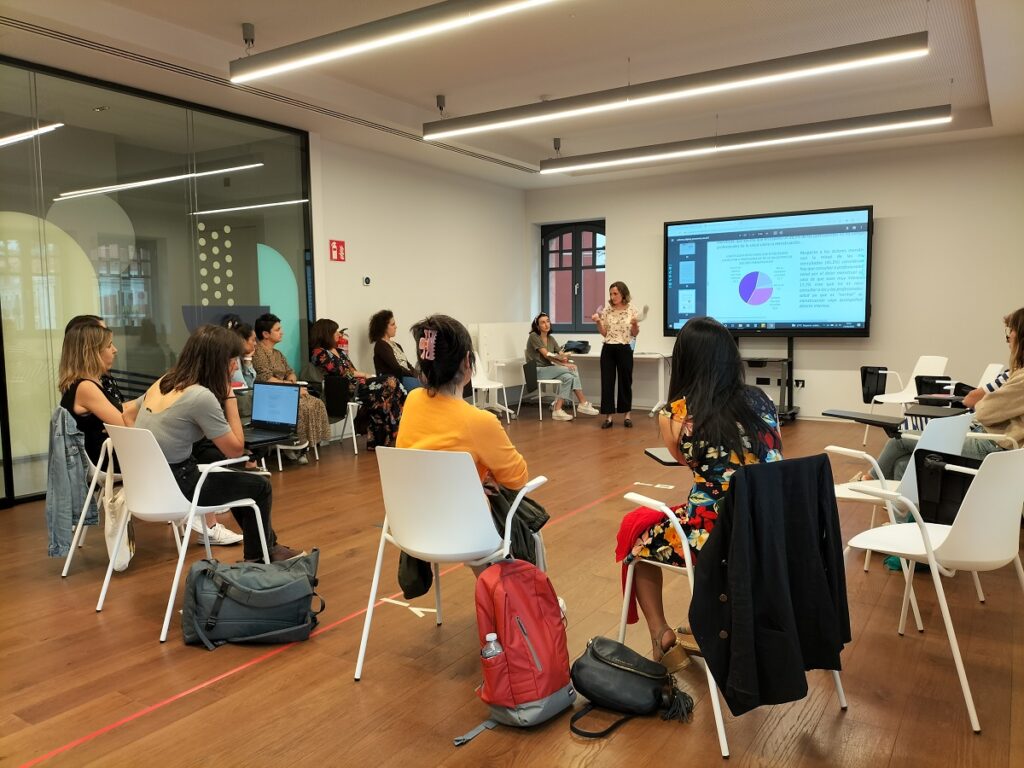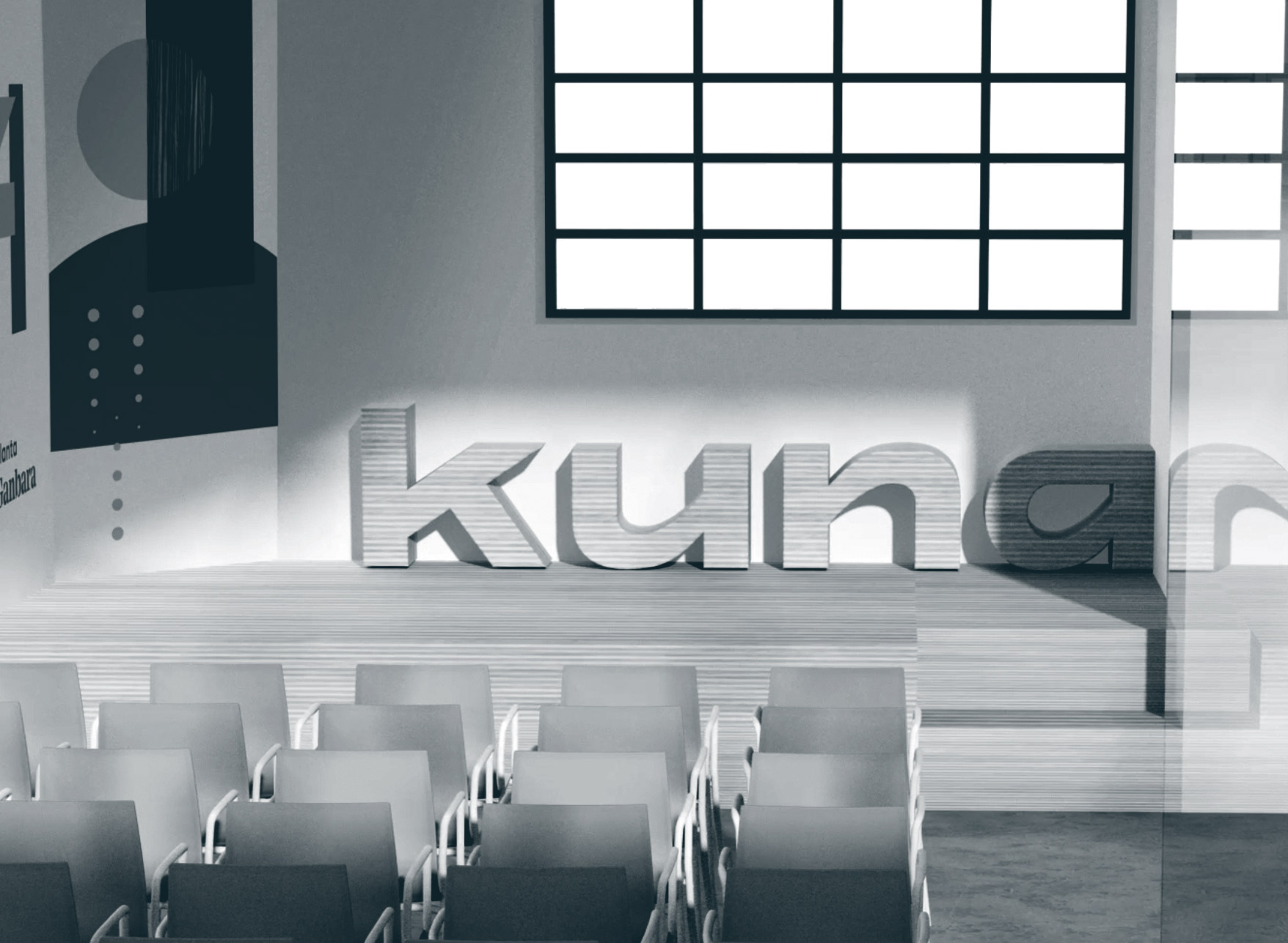One in five women in the EU cannot afford to buy intimate menstrual hygiene products.
BBK Kuna recognises this situation, which is invisible in our society and wants to address it, get to know it in greater depth and understand its approaches and implications. For this purpose, we have launched a pilot process within our Learning Communities of Practice. We want to talk about menstruation, its stigmatization, the climate impact of sanitary products, the situation of inequality this generates… The group is open to such a range of possibilities as diverse as its members.
Let’s talk about Period Poverty together!
Do you know what it is? What we are referring to?
Period Spain explains that period poverty means not having access to menstrual hygiene products, but also not having drinking water, soap and other essential resources for intimate hygiene and health.
BBK Kuna wants to bring this real problem to the citizens of Bizkaia so that the people who get together in the pilot process can experiment, learn and talk about their own experiences and practices related to period poverty.
We therefore invite you to participate in this pilot experience which we believe will prove valuable for our society. It will be a 3 or 4 month pilot process worked on over 6 sessions in which we expect to generate collective knowledge about period poverty. You do not have to be an expert on any subject, all you need is to feel drawn to this social inequality issue.
Are you interested in this subject? Would you like to learn, contribute, talk about and reflect on it? Write to us at kuna@bbk.eus, we would be delighted for you to come along. We look forward to seeing you at BBK Kuna.
A Thread in Time (Follow our sessions)
SESSION 1
In the first meeting of our community we focused on something as simple and vital as that, creating community. This way, we launched Bizitzaren hari gorria, this is the name with which we baptise this learning community and with which we want to represent a reality that unites us all.
We would like to highlight the diversity, both in terms of experience level, contact with the subject matter, age… even gender, with the participation of 2 men (new masculinity) who provide a wide range of needs and expectations of the people who make up the group.
We didn’t mince words and we spoke openly from experience, with anecdotes to laugh at and realities to reflect on. In general, the group shared the need to generate data and research. This is the first step to generate measures, without forgetting safer and closer communication and environments in which to talk about menstruation as freely as in this space.

SESSION 2
At our second meeting, on 22 February 2022, we decided to focus the following sessions and cover the sub-themes that most interest us on the basis of consensus. In this way, we sought to generate collective intelligence and give people time to prepare both questions and materials.
After generating debate on the subject in order to open our minds, we had the personal experience of Ana Enrich, co-founder of Period Spain, an organisation that has been working for the visibility of menstrual poverty in a very inspiring and active way, both at a social, neighbourhood and political level (even being heard in parliament).

Finally, and most importantly, we decided to explore the subject from the perspective of the person, getting to know our body, something fundamental that is nevertheless covered by a thick veil.
- 15th March. Menstrual health and self-knowledge.
Janire, sexologist and midwife, and Yolanda, nurse, will support us with their knowledge and medical vision.
- 29th March. Personal experiences, stigmatisation and the cultural dimensions of menstruation.
On this occasion Izaskun, Monica, Jiyoung and Bego will be the masters of ceremony, who, with their experience and the support of the facilitators, will try to capture the views of both participants and people around them.
- 12 April: (Date open to change by consensus of the CAP) Natural techniques for women’s menstrual health.
Malen and Marina will open the conversation by discovering a world that has aroused the curiosity of all of us. Through personal self-knowledge and natural female menstrual health techniques, we will learn about new and alternative methods.
SESSION 3
The third session confirms what we have been able to see with shining eyes. The group is already a cohesive community and continues to unite its ties to become stronger and stronger.
This time we broke participation records with 22 attendees, soon we will have to start thinking about filling stadiums =)
As always, we started the session with our beloved measure tape, this time, reviewing the vision of menstruation throughout history. Taking advantage of the historical thread, to Caesar what is Caesar’s, and who better than Maialen Ferreira, the journalist of the group to summarize the session for diario.es:
Eskerrik asko Maialen!!!!

SESSION 4
Fourth session and we are still learning and surprising ourselves as much as the first day. It is not only the documentation and information on menstrual poverty that is little or poorly exposed to the population, but the subject gives us a lot of opportunities to learn about.
That is why we continue to come to these sessions with so much enthusiasm and eagerness, with the aim of shedding some light and sharing in this atmosphere that we have managed to generate.
After a small drawing activity, with which to connect more as people and find our similarities, we continued uncovering the lid and reviewing the cultural evolution of menstruation and sexuality in literature through Izaskun and the phases that she has been recognising with her project @mundoivaginario:
1. Sexuality: sexual empowerment
2. Menstruation: menarche
3. Menstrual cycle: getting to know the cycle, phases, changes, energies, archetypes?
4. Climacteric period: embracing menopause
5. Reappropriation of our body: autoerotic techniques and feminine ejaculation.
A tremendously inspiring process, which also ends with the presentation of Skolastica and its live and collaborative expos, we hope to have them in Kuna soon.
From the hand of Ji Young and Monica (aka Myoung Jin Kim), our Korean delegation in Bilbao, we discovered that a culture that has recently dared to call things by their name, Menstruation and not Magic, the day…, is light years ahead in other ways. In other words, it’s a bit of a mixed bag.
Finally, with Bego and the ticking of the clock following us closely =), we discovered transgressive artistic performances and their potential to change mentalities and bring realities into the public spotlight: BRIAN DE PALMA, JUDY CHICAGO, CAROLEE SCHNEEMANN, ROCÍO BOLIVER, CASEY JENKINS, RUPI KAUR, LAETITIA KY, among others and part of a long list.

SESSION 5
We are back after a well-deserved holiday. We have all been very aware of the community, just ask Yolanda’s niece who, with her 2 new books, will soon be with us. We weren’t so many of us, but the subject is still engaging, Amagoia, could only stay for 5 minutes but.. =)
We continue with a general review of what we have learnt and done so far. And it’s not little! The aim of this session was to prepare for the open session on 24 May.
This is a magnificent opportunity to reach out to society, and we want to start with the definition of the theme. The general lack of knowledge about menstrual poverty and even the need to define it is a must.
We want to generate an event in which we not only share what we have learnt, but one with which to raise awareness and have an impact on the participants, give them something to talk about and some technique, advice… to apply in their homes. In short, to make it fashionable to talk about menstruation and use the words, vagina, vulva… without shame, as a tool to take steps and give visibility to poverty.
The idea is to open the event with a monologue, a poem… to continue with a quiz (to get the participants involved in the subject) and a theatrical round table among the participants to present all the work done.
At the same time, we will have an exhibition throughout the week, which will give us something to talk about and continue to make menstruation and menstrual poverty visible to the visitors of BBK Kuna.

SESSION 6
Finally, the day we were all waiting for has arrived, today we will work on the focus of Natural Female Menstrual Health. We have the collaboration of Malen and Esther “her little witch” who will open our eyes to this even more unknown world.
To start with them and understand the different reactions that we experience throughout the cycle, we began with a brief explanation of the menstrual cycle and its different phases. Follicular phase, luteal phase and the effects of estrogens and progesterone on our body.
We continued, talking about nutrition, without being experts, each participant commented on what foods, teas or home remedies work for them in each phase. A new approach to discover in a near future.
Finally, the moment arrived, Malen and Esther pulled the strings, to talk about their life experiences, Yoni eggs and above all, personal knowledge and our cyclicity. We saw how this can be connected to the lunar phase, as well as to what extent we are still connected to ancestral processes that have gradually been put aside and as powerful as the circular groups which our CAP can revive.
SESSION 7
After a break of almost a month, the community meets again. The impossible is real in this community and we thoroughly enjoyed the evaluation session 😅.
We started the session with Irama and Olaia, from EDE Fundazioa, Where is the data? We are very grateful for their availability, and for the presentation of the study on menstrual poverty in the Basque Autonomous Community, which will soon be presented to the Basque Parliament.
Among other things, this report revealed that 22.2% of women have had financial difficulties in accessing products, 82.5% have been forced to buy cheaper products and up to 58% consider that they have not had menstrual education.
Here is the link to the presentation: https://labur.eus/t2VeH
With this new data and through different activities, the community is committed to explore different approaches and actions.

We are committed to:
- Open Design: To create a snowball or multiplier effect around us. We may not all be able to participate in the sessions, but we would like our work to be easy to transmit. For this, and apart from the resources generated + word of mouth, we will look for a presence in social networks (Generation of reels + a fiction series on YouTube). + Generation of manuals.
- Distributed management, distribution of tasks: The next session will define the future of the CAP, one of the lines to be worked is the definition of roles. For this, Kuna will facilitate a session and methodology.
- Experimental Dynamics and action orientation: Moving on to the use of dance, theatre, meditation… as working tools when working on the different approaches.
- Participant Profiles, who do you miss? We are committed to generating a new sociogram, with which we can generate an outline of people we can and would like to reach. In this way, we can activate the snowball effect and, above all, capture new profiles (culture, origin, gender, level of education, economic power). We plan to start by relying on the associations detected in the EDE Fundazioa report and to reach the 9 women they talked with. + Transgender and LGTBIQ+ approach
- Inclusive community, spaces, dynamics… do they help? The community cannot stay only in Kuna. This is its base, but if we want to reach other profiles we have to go out on the streets.
See you again on 27 September. Anyone is welcome, so if you are interested, just get in touch.

